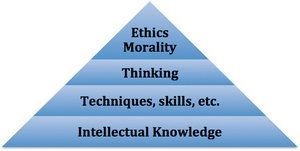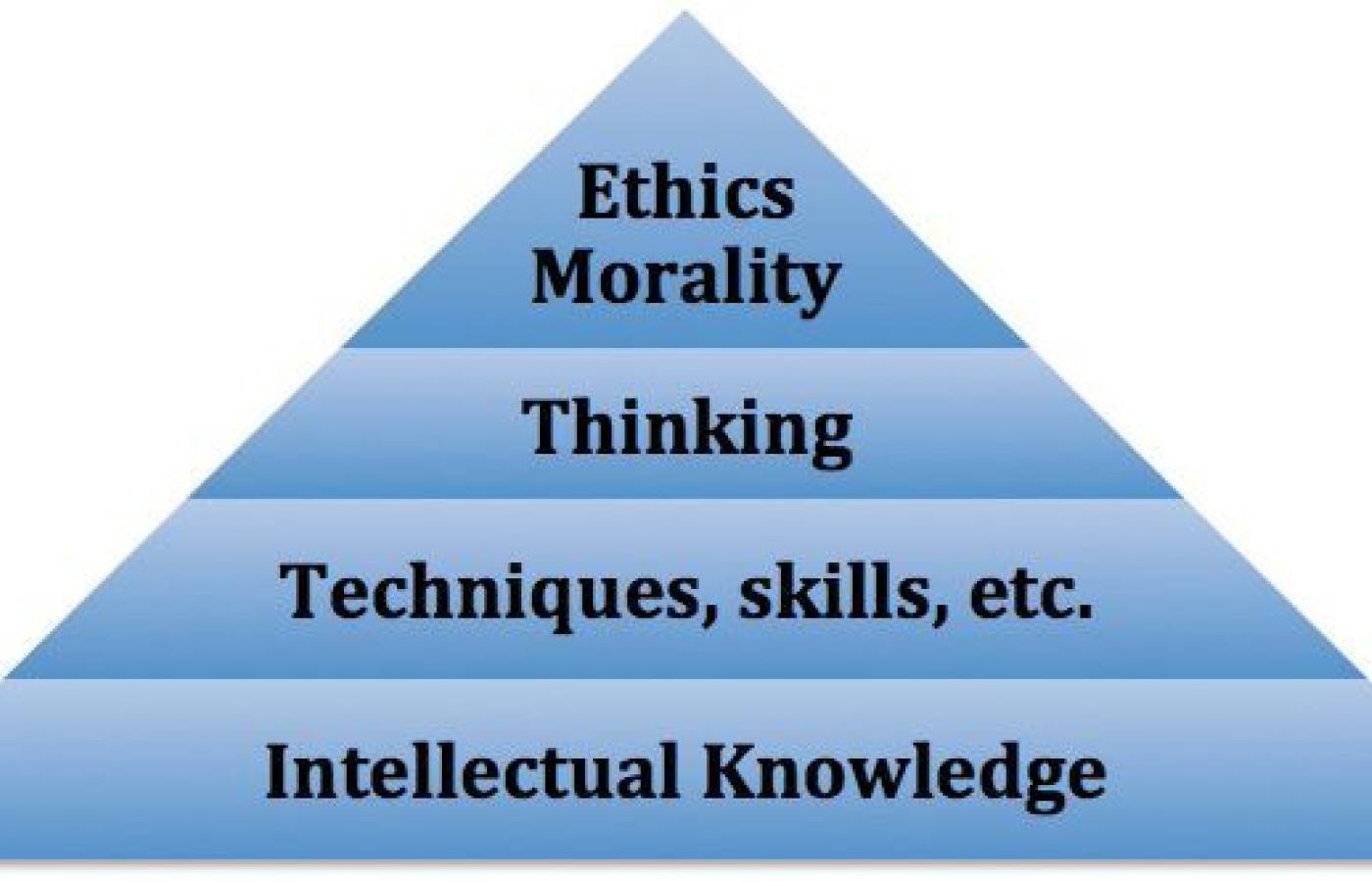The most important relationship I seek to nurture in the treatment room is the one a patient has with their own body. We live in a culture that teaches us to override pain, defer to outside authority, and push through discomfort. Patients often arrive hoping I can “fix” them, but the truth is, we can’t do the work for them. We can offer guidance, insight and support, but healing requires their full participation.
Footsteps of the Sages: An Apprenticeship with Dr. Kezhan Zhang
When I met Dr. Kezhen Zhang in May 2013, I was his translator and the integrity, creativity, and passion he demonstrated as a practitioner and advocate of the medicine convinced me to travel to Beijing to study with him.
I shadowed Dr. Zhang at his hospital, Beijing Tai Ji Tang Traditional Chinese Medicine Hospital, listening to patient intakes and observing his treatments, as well as watching him explaining the cases to his students (who were mostly Masters or post graduate level). This pyramid below is a schematic of how he perceives and practices the medicine.
Intellectual knowledge falls on the bottom and includes a wide range of subjects, not just Traditional Chinese Medicine (TCM), but also Western Medicine (WM), modern technology, the sciences, cultures, and more. Dr. Zhang believes that if one does not have this diverse knowledge, then one cannot treat a complex human being properly.
Knowledge needs to be applied; therefore, the next step is teaching techniques and skills by which one practices the medicine. Dr. Zhang adapts his teaching method to the individual student. For example, the Socratic method is used to open the mind and let the students absorb and develop the skills on their own while the more traditional clinic/demonstrative method is to show the student exactly what they should do and expect them to follow.

Another step up in the pyramid is thinking, which is the ability to correctly organize and apply knowledge and treatment that students must learn through experience and proper diagnosis.
On top of the pyramid is ethics/morality, which Dr. Zhang feels distinguishes the great from the good. A great doctor must always be aware of and guided by two things: compassion and empathy for the patients, being able to feel their pain as if it were one's own; and gratitude toward the patients for entrusting the doctor with their health. This is the heart of a healer and must preside over all the other aspects.
Dr. Zhang utilizes this model with his own theories and techniques to create a complete system. His diagnostic system was adapted from the Chi Fu Diagnosis Method in the Nei Jing (Chapter 17). And after practicing on himself for three years, he perfected his own Yuan Tong Acupuncture method.
His theory of physiological spaces (the spaces that exist in the body), inspired by the Dao De Jing, underlines all of these systems. He often says that once one truly understood the importance role of space in pathogenesis, one could detect and treat any disease before it even forms. Current medical research and treatment (both Western and Eastern) are all focused on the physical parts of the body, which often misses many warning signs.
A few cases of actual patients demonstrate how his system works.
A lady in her 60's was given the same diagnosis at several AAA hospitals (highest standard hospitals in China). She had sustained nerve damage and would never walk again. Dr. Zhang said, "I cannot make any guarantees, but let's work on it together." After one treatment, the lady was able to stand and even walked to the bathroom on her own. She said in bewilderment, "what shall I do with my wheelchair?" Dr. Zhang explained that although there may have been nerve damage, that was a result. The tightness of the muscles in her back was the cause. The loss of space around the nerve starved the nerve of nutrients and eventually led to nerve damage. If you open up the spaces (relax the muscles), then she would have a chance to recover. Proper diagnosing was crucial to treatment of this lady.
There were quite a few children who came in for kidney issue during my stay. Dr. Zhang explained that due to the overuse (abuse) of antibiotics (via IV) in China, especially on children with a simple cold or flu. Many of these children sustained internal organ damage (kidney and liver in TCM and WM), which later may develop into renal disease (e.g. glomerulonephritis). Hospitals may then give them Corticosteroids as treatment, which induce further damage and all kinds of strange symptoms may appear (e.g. purpura, vomiting and nausea, palpitations and other heart conditions, edema, etc.). Dr. Zhang often must spend a few months to a year treating these children, mainly to tonify their liver and kidney, but usually he had to first treat the initial cold that was never cleared. Often, these patients and their parents did not even know the origin of their years of health problems was one simple cold.
Dr. Zhang discovered the Wei Ji Syndrome through his years of experience and observations and named it after Hexagram 64 of the Yi Jing, which features water on the bottom and fire on top (cold below, heat above). This syndrome is predominantly found in the female population and may manifest as the following: cold in the lower abdomen and limbs, soreness in the back and neck area accompanied by dizziness and decrease in memory, heat symptoms such as acne or mouth ulcers, emotional issues etc. Often, the patient feels discomfort but nothing will show in medical tests. However, using Dr. Zhang's diagnostic method, one can see that physiological spaces have already been reduced (often by cold) and with time, the symptoms will worsen and the patient's normal endocrine functions, circulation and metabolism will be affected. Left untreated, physical changes will occur, such as fibroids, breast hyperplasia, and thyroid issues. Dr. Zhang often warn patients who have early symptoms of what may follow and some of them return years later to seek treatment after symptoms appear as he foretold.
Dr. Zhang truly integrates Western and Eastern medicine in his hospital. His background as a medical doctor made it easy for him to transition between the two. He has also reclaimed the "art" in Chinese medicine, treating each patient uniquely, according to his or her individual stories/lives. He explains disease using Western concepts but treats according to principles in Traditional Chinese Medicine. What is the liver channel? It is a system that links together much of the female reproduction related organs and endocrine functions, such as the Uterus, breasts and thyroids. Why are we dizzy (or our heads hurt) after we have been exposed to wind or cold? Because wind/cold constricts the skin/muscles of the neck (esp. the nape), hence treating the Taiyang channel works because it releases the muscles of the neck and allows for normal circulation again. These are just examples of how he translates Chinese theory into the language of Western medicine.
Dr. Zhang often refers to the first chapters of the Su Wen, which stress the importance of disease prevention and maintaining good health through lifestyle. Is the pattern differentiation method that we currently use true "prevention" if we are detecting functional changes that are results of an already existing pathological development? How can we prevent these pathological changes from even happening or catch them in their earliest stages? When we are busy, it's easy to become reliant on techniques. But if we do not diagnose the cause, we cannot return the patient to health completely.
Demonstrating an insatiable quest for knowledge, Dr. Zhang studies every night, immersing not just in books that are relevant to TCM, but also subjects as diverse as bioengineering, cloud computing, even mathematics, such as the Nash Equilibrium. He believes that at the highest level of thought, all these subjects are linked and can be understood if not in their specifics, at least in relation to the general law (dao) that underlies life and the universe. This "extra-curricular" knowledge allows him to better understand our world, which helps him when he treats patients. His favorites books are about Buddhist and Daoist philosophy, which he says can guide one to become a better person, and thereby, a better practitioner. The last book he bought before I left was about the Butterfly Effect (he finds it fascinating).
It is said that a person cannot proclaim himself a master; it's what he does and the respect that he inspires that lead others to bestow that title upon him. By this definition, I can say that I have been fortunate to study with a true Master, following in the footsteps of the Sages of Antiquity.



